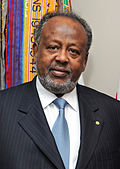| ||||||||||||||||||||||||||||
All 65 seats in the National Assembly 33 seats needed for a majority | ||||||||||||||||||||||||||||
|---|---|---|---|---|---|---|---|---|---|---|---|---|---|---|---|---|---|---|---|---|---|---|---|---|---|---|---|---|
| Registered | 184,160 | |||||||||||||||||||||||||||
| Turnout | 66.60% ( | |||||||||||||||||||||||||||
| ||||||||||||||||||||||||||||
 Results by region | ||||||||||||||||||||||||||||
| ||||||||||||||||||||||||||||
 |
|---|
| |
Parliamentary elections were held in Djibouti on 22 February 2013. [1] After their boycott of the 2008 elections, opposition groups contested the elections as the Union for National Safety alliance. [2]
Contents
According to government figures, the ruling Union for the Presidential Majority won 55 of 65 seats in Parliament, while the USN won the remaining 10 seats. It was the first time since independence in 1977 that opposition parties had been represented in the legislature. However, the USN claimed the figures for Djibouti city were falsified and released alternative results which would have reduced the UMP to 34 seats and increased their total from 10 to 31.

